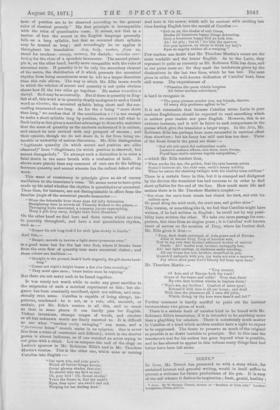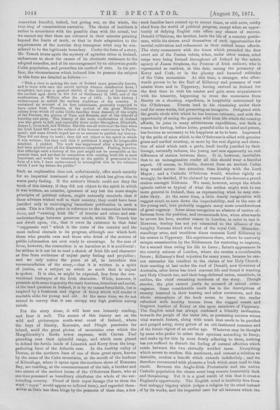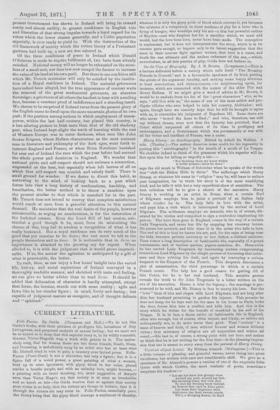IERNE.*
IN Icrue, Mr. Trench has presented us with a story which, for sustained interest and graceful writing, would in itself suffice to procure a welcome for future productions of his pen. It is racy of the soil whence it derives its inspiration ; fresh, genial, healthy ; Ierne, By W. Steuart Trench, Author of "Ilealitioa of Irish Life." London: Louguatue, Linen, and Co.
somewhat fanciful, indeed, but giving out, on the whole, the true ring of conscientious narrative. The choice of incidents is rather in accordance with the possible than with the actual, but we cannot say that these are coloured in their minuter painting beyond the limits of truth, or that in their adaptation to the requirements of the novelist they transgress what may be con- sidered to be the legitimate boundary. Under the form of a story, Mr. Trench treats again the mystery of agrarian crime in Ireland, endeavours to show the causes of its obstinate resistance to the adopted remedies, and of its encouragement by an otherwise gentle Celtic population, and prescribes his method of cure. In his pre- face, the circumstances which induced him to present the subject in this form are detailed as follows :-
"With a view to making the case of Ireland more generally known, and to trace with care the secret springs whence disaffection flows, I completed, last year, a general sketch of the history of Ireland from the cattiest ages down to the Act of Settlement in 102, and of the confiscations of William after the war of 1091. In this history I endeavoured to unfold the earliest traditions of the country. It contained an account of its first inhabitants, generally supposed to have come from Phoenicia, of the arrival of the great Milesian colony from which all noble Celtic families trace descent, of the origin of the Fenians, the glories of Tara and Emania, and of the schools of learning and piety. The history of the main confiscations of Ireland was also given in full, and especially those under Strongbow, Elizabeth, James I., Cromwell, and William. But this was all written at the time when the Irish Land Bill was the subject of the keenest controversy in Parlia- ment; and some friends urged me on no account to publish my history. They did not deny its truth; they did not object to the spirit in which it was written; but they said that if published it might do irreparable mischief. I yielded. The work was suppressed after a large portion had been printed and all the illustrations completed. Feeling, however, that although such a history of the past might not be acceptable at the present time, and yet that its connection with existing Irish life is most important, and would bo interesting to the public if presented in the form of a tale, I have endeavoured to accomplish this in the volumes which I now lay before the public."
Such an explanation does not, unfortunately, offer much security for an impartial treatment of a subject which has given rise to warm party feeling. If the author's friends could not deny the truth of this history, if they did not object to the spirit in which it was written, an outsider, ignorant of any but the more simple
principles of political reform, might naturally conclude that if these advisers wished well to their country, they could have been justified only in encouraging" immediate publication in such a crisis. This is a little point in reference to the connection between !erne, and "existing Irish life" of trouble and crime and mis- understandings between generous minds, which Mr. Trench has not dwelt upon, viz., that it owes its existence to that fatal " suppressio veri " which is the curse of the country and the most radical obstacle to its progress, although one which both those who preside over and those who drink of the sources of public information are ever ready to encourage. In the case of ler rte, however, the connection is as harmless as it is accidental ; for seldom is it our lot to read a sketch of Irish life and character as free from evidences of unjust party feeling and prejudice ; and we only notice the point at all, to introduce this recommendation of the story,—that it is written in a spirit
of justice, on a subject on which so much that is unjust is spoken. It is also, as might be expected, free from the con- ventional burlesque of the Irish character. While, however, it presents with some in gen uity the main features, historical and social, of the land question in Ireland, it is by no means formidable, but is inspired by a freshness and vigour of fancy which will render it readable alike for young and old. At the same time, we do not intend to convey that it can occupy any high position among novels.
For the story alone, it will bear one leisurely reading, and bear it well. The scenes of this history are on the wild and picturesque south-west coast of Ireland, , where the bays of Bantry, Kenmare, and Dingle penetrate far inland, amid the great plexus of mountains over which the Macgillicuddy's Reeks tower supreme, with Carron Tual presiding over their splendid range, and which seem placed to defend the fertile lands of Limerick and Kerry from the long- gathering force of the Atlantic seas. In the healthy valley of Derran, at the northern base of one of these great spurs, known by the name of the Calm mountains, at the mouth of the harbour of Kilmalloge, where it opens upon the southern shore of Kenmore Bay, are residing, at the commencement of the tale, a brother and two sisters of the ancient house of the O'Sulevans Beare, who at one time possessed as hereditary chieftains the whole of the sur- rounding country. Proud of their royal lineage (for to them the word " royal" would appear no iufiated term), and regarded them- selves as little less than kings by the peasants of their clan, a few
such families have existed up to recent times, or still exist, coldly aloof from the world of political progress, except when an oppor- tunity of defying English rule offers any chance of success. Donald O'Sulevan, the brother, leads the life of a country gentle- man, while his sisters avail themselves of such opportunities for mental, cultivation and refinement as their retired home affords. The story commences with the times which preceded the first overt act of the Fenian rebels, when, under other names, rebel corps were being formed throughout all Ireland by the subtle agency of James Stephens, the Protests of Irish outlaws, who is represented as resident, at this date, among the peasantry of Kerry and Cork, or in the gloomy and haunted solitudes of the Cabo mountains. At this time, a stranger, who after- wards proves to be the Earl of Killarney and possessor of vast estates there and in Tipperary, having arrived iu Ireland for the first time to visit his estates and gain some acquaintance with his tenantry, happening to cross the mountains from Bantry on a shooting expedition, is hospitably entertained by the O'Sulevans. Events lead to his remaining under their roof for some weeks, but preserving an incognito. Delighted with the gentle circle with which he has become intimate, and with the opportunity of seeing the genuine wild Irish life which the country affords, ho joins in many adventurous expeditions, nor finds a reason for leaving, before Ierne, graceful alike in mind and person, has become as necessary to his happiness as he to hers. Impressed by the pride of mien which in the O'Sulevans is allied with genuine grace and cordial courtesy, or more by the real dignity and eleva- tion of mind which such a pride, itself hardly justified by their lineage, naturally induces, the young earl sees apparently no real difference of station between them. It is, however, inevitable that to an unimaginative reader all this should wear a fanciful aspect. Of course, in Dublin, descent from an ancient Celtic king would secure less attention than kinship with the Lord Mayor ; and a Catholic O'Sulevan would, whether rightly or wrongly, be derided, if he claimed by reason of his descent a proud station amongst Irishmen. We must, however, accept the whole episode rather as typical of what the author might wish to see more general in Ireland, than as representing what he may con- sider likely. At the same time, a little timely imagination will suggest much to tons down the improbability, and in the case of the young earl, love probably suggests many more considerations of great cogency. Immo alouts recognizes an absence of matter-of- factness from the position, and recommends him, when afterwards he avows his love, another season in London, in order to test it However, destiny has not yet consented to the alliance of the haughty Norman blood with that of the royal Celt. Misunder- standings arise, and troublous times summon Lord Killarney to his estates in Tipperary. His experiences there, where he narrowly escapes assassination by the Ribbonmen for venturing to improve, for a second time owing his life to Ierne ; Ierne's appearance in the courtly saloons of London, where she creates a considerable furore ; Killarney's final rejection for many years, because he can- not surrender his intellect to the claims of her Holy Church ; their meeting at last under the roof of Donald, now Governor of Australia, after feriae has tried convent life and found it wanting and Holy Church too, and their long-deferred union, constitute, in outline, the chief remaining incidents of the story. Though slender, the plot cannot justly be accused of actual extra- vagance. Some considerable merit lies it; the descriptions of scenery inserted in their boating and other excursions, and the whole atmosphere of the book seems to leave the reader refreshed with healthy breezes from the rugged coasts and fragrant heather of Kerry or the open meadows of Tipperary. The English mind has always confessed a friendly inclination towards the people of the sister isle, as possessing natures whose vital warmth fosters, along with much that needs to be purified and purged away, many germs of an old-fashioned romance and of the heroic vigour of an earlier age. Whatever may be thought by some who prefer to select their opinions according to fancy, and make up for this by more firmly adhering to them, nothing has yet sufficed to disturb the feeling of natural affection which exists between the two eternally wedded races. Everything which serves to confirm this sentiment, and cement a relation so desirable, confers a benefit which extends indefinitely ; and we therefore recommend with pleasure a book which must tend to this result. Between the Anglo-Irish Protestants and the native Catholic population the chasm must long remain lamentably dark and threatening. Yet it is a good result of this that it creates England's opportunity. The English mind is healthily free from that unhappy bigotry which judges a religion by its creed instead of by its works, and the impartial care for all interests which the
present Government has shown in Ireland will bring its reward surely and almost swiftly, in greater confidence in English rule and liberation of that strong impulse towards a loyal regard for its rulers which the lower classes generally, and a Celtic population especially, is ever ready to yield to. With the destruction of the old framework of society which the rotten theory of a Protestant garrison had built up, a new era was ushered in.
Of the three conditions of peace in Ireland which Donald O'Sulevan is made to require fulfilment of, two have been already satisfied. National money will no longer be exhausted on the mem- bers of a small sect, nor does law now compel the farmer to increase the value of his laud at his own peril. But there is one condition still which Mr. Trench maintains will only be satisfied by the institu- tion of a Royal residence in Ireland. The material grievances have indeed been allayed, but the true appearance of content waits the removal of the great sentimental grievance, an absentee Sovereign; a grievance of all others the hardest to bear with a smiling face, because a constant proof of indifference and a standing insult. We choose to be surprised if Ireland turns from the present glory of the English name to dwell upon the more uncertain glories of its own past; if the position among nations in which employment of steam- power, within the last half-century, has placed this country, is a less alluring picture to Irish taste than that of the old shadowy past, when Ireland kept alight the torch of learning while the rest of Western Europe was in outer darkness, when men like John Scotus Erigena, whom Hallam characterizes as the most eminent man in literature and philosophy of the dark ages, went forth to instruct England and France, or when Brien Boroilune banished for over out of Ireland the race which the year before had secured the whole power and dominion in England. We wonder that national pride and self-respect should not embrace a connection, ungrateful at the best, but especially when left barren of all on which that self-respect can nourish and satisfy itself. There is small ground for wonder. If we desire to divert this habit, so narrowing to the mind, of looking back to a past which forces into view a long history of confiscations, hardship, and humiliation, the better method is to throw a sunshine upon the present similar to that which is searched for in the past. Mr. Trench does not intend to convey that complete satisfaction would result at once from a graceful attention to this natural demand. He maintains that the real desire of the people, however unreasonable, as urging an anachronism, is for the restoration of the forfeited estates. Even the Land Bill of last sessiou, sub- stantial a good though it be, must, from its minimizing the chance of this, long fail to awaken a recognition of what it has really bestowed. But a royal residence can do very much of the good that yet remains to be done ; the rest must be left to the people themselves and to time. It is noticeable that in Ierne no importance is attached to the growing cry for repeal. When alluded to, it is with the judgment that it would prove impracti- cable. If so, the sooner the agitation is anticipated by a gift of what is practicable, the better.
To such, then, as can enjoy a few hours' insight into the varied life, history, and social aspirations of Ireland conveyed in a thoroughly readable manner, and sketched with taste and feeling, we can give no better advice than to read lerne. It should be added that delineation of character is hardly attempted, except that Ierne, the heroine, stands out with some reality ; agile and fawn-like in her slender figure ; in mind, lively and daring ; but capable of judgment mature as energetic, and of thought delicate and " spirituel."
































 Previous page
Previous page